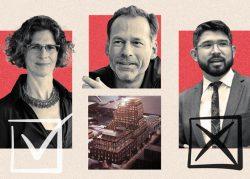Corey Johnson’s comprehensive planning bill will never pass, for the same reason all such bills never pass: It dilutes the power of neighborhood cranks and naive ideologues to stop new housing.
Predictably, a coalition of the city’s leading NIMBY groups blasted the City Council speaker’s proposal Thursday as a “top-down approach that would leave communities with even less democratic control over massive city rezonings” than they have now.
Well, yes. That is exactly the point.
Not to be anal, but this is not a direct democracy. It’s a republic. We elect leaders, who in turn run the government. We don’t let people with pitchforks decide what can be built where.
The reason is obvious: Left to their own devices, locals make decisions in their own interests, not those of society at large.
For example, limiting the supply of new homes will make your own more valuable, because shoppers will have fewer options. It also spares you from the annoyances of construction — noise, dust, ugliness — costs that the people who move in never have to bear.
Read more



When you think about these issues the way economists do, they become clear. Figure out who bears the costs and who reaps the benefits and you can predict how people will respond.
Urban planners and good-government types have been talking for decades about comprehensive planning, knowing that when localities make choices, they never sacrifice for the greater good.
Case in point: It would make sense for the metro area to transport goods by rail to Maspeth, where they could be loaded onto small trucks for short trips to stores in the city and on Long Island. But in that scenario, Maspeth bears the cost of more truck traffic, while the benefits — fewer overall truck trips, lower emissions, longer-lasting roads and bridges — are spread across the region. You can’t blame Maspeth for opposing that plan. That is why top-down planning is essential.
There are other advantages: A more predictable approval process would lower costs for developers, who currently might spend $1 million or more to get a single rezoning through the City Council. And sometimes the local Council member, who singularly controls the fate of rezonings, makes extreme demands or simply says no. Developers compensate for bearing those costs and risks by planning apartments with high profit margins — and the opponents demanding affordability wonder why.
Johnson’s scheme, in a nutshell, simplifies the process by having planning experts decide what could go where, and any project meeting those terms would be approved. The point is not just to lower costs but to have development where it makes sense — near mass transit and other infrastructure that supports it.
“This is a very top-down, dictatorial process,” the NIMBY coalition declared. “For comprehensive planning to be truly democratic it cannot be decided and fast-tracked by those appointed by the mayor.”
But for reasons just explained, comprehensive planning cannot be truly democratic. It would be like letting people decide individually how much tax to pay: Each would pay less than he is paying now, leaving the government unable to provide services and systems that benefit society as a whole.
New York’s lone YIMBY group, Open New York, thinks Johnson’s plan should go further because “it fails to address longstanding practices that allow wealthier neighborhoods to block new housing and shunt demand elsewhere,” said board member Will Thomas.
He was disgusted but hardly surprised by the letter from the anti-development groups including Village Preservation, Voice of Gowanus, Stop Sunnyside Yards, Soho Alliance and the Coalition to Protect Chinatown and the Lower East Side.
“We encourage legislators interested in more equitable city planning to ignore complaints by wealthy NIMBYs who are primarily interested in protecting the status quo,” Thomas said.
Johnson’s plan is a noble gesture that will end up in the ever-growing graveyard of comprehensive planning proposals. But it serves a purpose by keeping the flame alive on a crucial issue, not to mention sparking some entertaining Twitter exchanges.
“As a lifelong resident of Bayside, I’m appalled by the introduction of legislation that robs our communities of the power to have a say in housing development and forces us to accept a system that thoughtlessly adds density,” tweeted Austin Shafran, a City Council candidate.
“Funny thing about Bayside…” someone responded, noting that the neighborhood was ranked among the most expensive housing markets in the nation for comparable detached homes.
Rest assured, whoever wins the seat in Bayside will vote to keep it that way.
